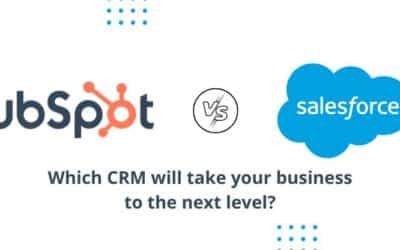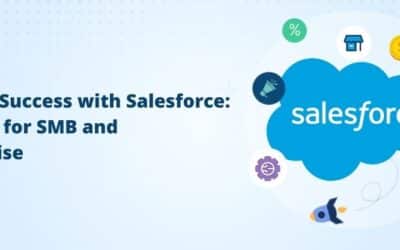Summary of the Article
Have a project in mind?
Schedule a CallSalesforce vs AWS: Who is the Better Cloud Service Provider?
Summary of the Article
Choosing the right cloud service provider is a big decision for any business. Whether you need a reliable cloud infrastructure or a robust CRM solution, two names stand out—AWS and Salesforce.
Amazon Web Services (AWS) is the backbone of countless applications, offering cloud storage, computing power, AI, and security solutions. It’s built for businesses that need scalability, flexibility, and control over their cloud environment.
Salesforce, on the other hand, is a leader in customer relationship management (CRM), helping businesses improve sales, marketing, and customer service. With built-in automation and AI-driven insights, Salesforce is the go-to platform for companies looking to strengthen customer relationships and drive growth.
So, when it comes to AWS services vs Salesforce, how do they compare? Which one is the better choice for your business?
In this detailed comparison, we’ll break down their core differences, strengths, and best use cases, making it easier for you to decide. If you’re considering Salesforce consulting services or AWS cloud solutions, understanding what each platform offers is the first step.
Let’s take a closer look.
What is AWS?
When it comes to cloud computing, AWS (Amazon Web Services) is the undisputed leader. Powering everything from startups to Fortune 500 companies, AWS provides a highly scalable, secure, and flexible cloud platform that supports a wide range of business needs.
The Scale of AWS in the Cloud Market:
- AWS holds a 31% market share in the global cloud infrastructure market, making it the largest cloud provider, ahead of Microsoft Azure (25%) and Google Cloud (11%).
- More than 1 million active customers across 190 countries use AWS for their cloud infrastructure.
- Some of the biggest companies, including Netflix, Airbnb, NASA, and Pfizer, rely on AWS to run their critical operations.

Core AWS Services
AWS provides over 200 fully-featured services, but its key offerings fall into a few major categories:
- Compute Power – EC2 provides scalable virtual servers, while Lambda supports serverless computing.
- Cloud Storage – S3 enables large-scale data storage, and Glacier offers low-cost archival solutions.
- AI & Machine Learning – SageMaker simplifies AI model development, and Rekognition handles image recognition.
- Networking & Security – VPC secures cloud networking, CloudFront accelerates content delivery, and IAM manages access control.
- Databases & Analytics – RDS supports SQL databases, DynamoDB handles NoSQL, and Redshift powers data warehousing.
Who Uses AWS?
AWS is widely adopted across industries due to its flexibility and enterprise-grade reliability.
Technology & Startups
Spotify, Airbnb, and Slack rely on AWS to handle millions of users while scaling operations efficiently.
E-commerce
Amazon, eBay, and Shopify run on AWS to manage high-traffic global sales with seamless uptime.
Finance & Banking
Goldman Sachs and Capital One use AWS for secure, real-time financial transactions.
Healthcare & Pharmaceuticals
Pfizer and Moderna process massive research datasets using AWS-powered AI.
Entertainment & Media
Netflix and Disney+ deliver high-performance video streaming with AWS infrastructure.
| Industry | Companies Using AWS | Use Case |
|---|---|---|
| Technology & Startups | Spotify, Airbnb, Slack | High-speed cloud computing, scalability |
| E-commerce | Amazon, eBay, Shopify | Seamless global operations, high-traffic management |
| Finance & Banking | Goldman Sachs, Capital One | Secure financial transactions, fraud detection |
| Healthcare & Pharma | Pfizer, Moderna | AI-driven research, big data processing |
| Entertainment & Media | Netflix, Disney+ | High-performance video streaming |
AWS Services vs Salesforce: How Businesses Choose
When it comes to AWS services vs Salesforce, the decision largely depends on a company’s priorities:
- If a business needs infrastructure, storage, AI capabilities, and computing power, AWS is the better choice.
- If the focus is on customer relationship management (CRM), automation, and sales-driven insights, Salesforce is more suitable.
Companies that need both often integrate AWS and Salesforce, using AWS for backend cloud computing while leveraging Salesforce consulting services for CRM and sales automation.
What is Salesforce?
Salesforce is the world’s leading cloud-based CRM (Customer Relationship Management) platform, designed to help businesses manage sales, marketing, and customer service in a more efficient and connected way. With an extensive suite of tools, Salesforce enables companies to streamline operations, improve customer interactions, and drive revenue growth.
Salesforce as A Market Leader in CRM
- Salesforce holds a 23.8% market share in the global CRM market,making it the #1 CRM provider.
- More than 150,000 companies, including Fortune 500 giants like Amazon, Spotify, and Adidas, use Salesforce to manage customer relationships.
- Salesforce reported $31.4 billion in revenue in 2023, reflecting a steady rise in cloud-based CRM adoption.

Key Salesforce Services: Powering Customer Success
Salesforce offers a wide range of solutions, but its core services focus on sales, customer service, and marketing automation:
1. Sales Cloud
Manages leads, accounts, and sales pipelines to help businesses close deals faster.
2. Service Cloud
Manages leads, accounts, and sales pipelines to help businesses close deals faster.
3. Marketing Cloud
Automates email marketing, social media, and digital campaigns to boost engagement.
4. Commerce Cloud
Enables personalized e-commerce experiences for online retailers.
5. AI-Powered Analytics (Einstein AI)
Uses artificial intelligence to provide predictive insights and automate workflows.

How Salesforce Enhances Customer Relationships & Sales Growth
- Consolidates customer interactions, sales data, and support history into a single, real-time dashboard for a 360-degree customer view.
- Automates tasks with AI-powered tools like Salesforce Einstein, improving efficiency and allowing sales teams to focus on high-impact activities.
- Enables advanced customer segmentation and tailored marketing campaigns, driving higher engagement and conversion rates.
- Scales seamlessly from small businesses to global enterprises, offering extensive customization to meet diverse industry needs.
The Role of Salesforce Consulting Services in Business Success
Implementing Salesforce effectively requires expert guidance—this is where Salesforce consulting services play a crucial role.
- Customization & Integration – Consultants help tailor Salesforce to business needs and integrate it with third-party tools.
- Training & Support – Ensures teams fully utilize Salesforce features for maximum efficiency.
- Automation & AI Implementation – Helps businesses leverage AI-driven insights for better decision-making.
- Data Migration & Security – Ensures smooth transition from legacy systems with a focus on security and compliance.
Salesforce vs AWS: Different Strengths for Different Needs
While AWS and Salesforce both dominate the cloud space, they serve very different purposes:
- AWS focuses on infrastructure, computing, and AI-driven cloud solutions.
- Salesforce specializes in CRM, customer engagement, and sales automation.
For businesses looking to streamline sales, marketing, and customer service, Salesforce is the best choice. And with Salesforce consulting services, organizations can fully optimize their CRM strategy for maximum growth.
Salesforce vs AWS – Core Differences and Capabilities

While both AWS and Salesforce are cloud-based solutions, they serve distinct purposes in the digital ecosystem. AWS focuses on cloud computing infrastructure, while Salesforce is built around customer relationship management (CRM). Understanding their core differences is key to choosing the right platform for your business.
How Businesses Choose Between AWS and Salesforce
- AWS is the right choice if your company needs robust cloud computing, AI-driven applications, or scalable storage solutions.
- Salesforce is the best fit if you’re focused on sales, marketing automation, and customer relationship management.
- Some businesses use both—leveraging AWS for backend cloud services while using Salesforce for CRM and customer data management.
AWS Services vs Salesforce – Pros and Cons
✅ AWS: Pros
- Highly scalable cloud platform supporting global workloads and enterprise applications.
- Over 200+ cloud services, including compute, AI/ML, storage, and networking solutions.
- Flexible and customizable, offering developers full control over cloud infrastructure.
- Enterprise-grade security with IAM, VPC, and encryption to protect sensitive data.
- Cost-efficient for large-scale workloads with a pay-as-you-go pricing model.
❌ AWS: Cons
- Steep learning curve, requiring technical expertise for setup and optimization.
- Complex pricing structure, which can become expensive without proper cost management.
- Not CRM-focused, requiring integrations for customer relationship management, sales, and marketing tools.
✅ Salesforce: Pros
- Industry-leading CRM platform for sales, marketing, and customer engagement.
- User-friendly interface with low-code customization for businesses of all sizes.
- AI-powered automation (Salesforce Einstein) for smarter decision-making and workflow efficiency.
- Seamless third-party integrations, including AWS, Google, Microsoft, and various enterprise apps.
- Predictable subscription-based pricing, making it easier for businesses to plan expenses.
- Salesforce consulting services help businesses optimize CRM implementation and customization.
❌ Salesforce: Cons
- Limited infrastructure capabilities, as it is not built for cloud hosting, AI/ML training, or large-scale storage like AWS.
- Higher costs for advanced features, especially for larger organizations and enterprise solutions.
- Customization constraints, as deep modifications require Apex coding and third-party consultants.
AWS Services vs Salesforce – The Final Verdict
AWS and Salesforce are both powerhouses in the cloud world, but they solve very different problems. AWS is built for businesses that need raw computing power, AI capabilities, and scalable cloud storage, while Salesforce is designed to help companies manage customer relationships, automate sales, and drive engagement. Choosing between them isn’t about which is better—it’s about what your business needs most.
The future of cloud computing is all about AI, automation, and integration. Companies like Netflix and Coca-Cola already use AWS for backend infrastructure and Salesforce for customer management, proving that you don’t always have to choose just one. If your business needs a powerful cloud foundation, AWS is the way to go. If you want to enhance customer interactions and streamline sales, Salesforce is the perfect fit.
AWS Services vs Salesforce – Still Unsure?
The right cloud strategy can make or break your business. Whether you need Salesforce consulting services to fine-tune your CRM or AWS cloud support to scale your infrastructure, expert guidance can help you make the smartest choice. Let’s talk about what works best for you—get in touch today!











